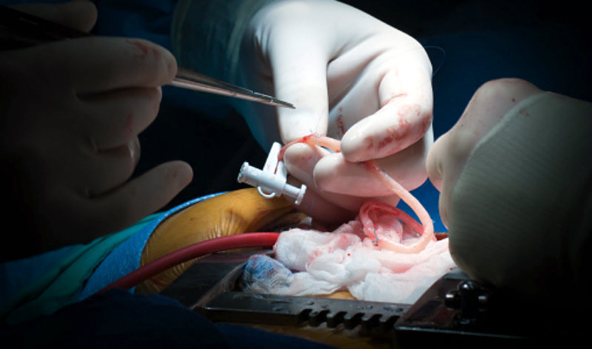Source: nejm.org Jul 05, 2018 7 years, 7 months, 3 weeks, 6 days, 27 minutes ago
Using a radial artery graft as a second conduit in coronary artery bypass grafting (CABG) surgery results in a significantly lower risk of heart attack and repeat revascularization at 5 years than using a saphenous vein graft, according to the results of a meta-analysis recently published in The New England Journal of Medicine.
Using a radial artery graft instead of a saphenous vein graft in coronary artery bypass grafting surgery results in a significantly lower risk of heart attack and repeat revascularization at 5 years, researchers reported.
Current guidelines already recommend using multiple arterial grafts for CABG.“Despite these recommendations, arterial grafts have not been widely adopted,” wrote investigators led by Mario Gaudino, MD, Department of Cardiothoracic Surgery, Weill Cornell Medicine, New York, NY, and Umberto Benedetto, MD, PhD, Bristol Heart Institute, Bristol, UK. “In the United States, less than 10% of patients who undergo elective CABG receive more than one arterial graft, and a radial artery graft is used in less than 7%.”
Surgeons’ reluctance to use multiple arterial grafts can be partially explained by the fact that the clinical benefit of additional arterial grafts reported in observational studies hasn’t been confirmed by randomized clinical trials, the researchers noted. For this investigation, they performed a patient-level combined analysis of 6 randomized, controlled CABG trials that included a total of 534 patients with radial artery grafts and 502 patients with saphenous vein grafts.
After an average follow-up of 5 years, the incidence of adverse cardiac events was significantly lower in patients with radial artery grafts than in those with saphenous vein grafts (HR 0.67, 95% CI 0.49-0.90,
P=0.01). Use of radial artery grafts was associated with a significantly lower risk of occlusion (HR 0.44, 95% CI 0.28-0.70,
P < 0.001), a nominally lower incidence of heart attack (HR 0.72, 95% CI 0.53-0.99,
P=0.04), and a lower incidence of repeat revascularization (HR 0.50, 95% CI 0.40-0.63,
P < 0.001).
These clinical benefits appeared more evident in patients younger than 75 years of age, in those without renal insufficiency, and in women. Which target vessel was chosen for the radial artery graft didn’t have a significant effect.
The researchers also noted that the use of radial artery grafts was associated with higher rates of graft patency on angiography, “a finding that offers a biologic mechanism to explain the observed advantage in clinical outcomes,” they wrote.
However, better patency of radial artery grafts didn’t translate into improved survival at 5 years (HR 0.90, 95% CI 0.59-1.41,
P=0.68).
The researchers acknowledged that a limitation of their study was that the overall number of patients was relatively small for a procedure as common as CABG, even when using a combined-analysis approach.
In addition to the article in
The New England Journal of Medicine, the investigators reported their findings at a presentation during the American Association of Thoracic Surgery 98th Annual Meeting, held April 30, 2018, in San Diego, CA.
gt;
“This is the first randomized-based demonstration of a definitive important clinical benefit using the radial artery over the saphenous vein for coronary bypass surgery,” Dr. Gaudino said. “The radial artery makes the operation relatively easier compared to other arteries, and I believe that our results have the potential to change practice.”
Senior author David Taggart, MD, PhD, professor, Department of Cardiovascular Surgery, University of Oxford, Oxford, UK, noted that further research with a longer follow-up period could confirm that using radial artery grafts in CABG surgery confers better clinical outcomes. “Apart from the obvious clinical benefits of the radial artery over vein graft at 5 years, the question of whether this could also eventually translate into a survival benefit over the longer term with continuing attrition of vein grafts remains an important possibility and will be the subject of future research,” he said.
This research was supported by the Department of Cardiothoracic Surgery of Weill Cornell Medicine, the National Institute for Health Research Bristol Biomedical Research Centre, and the Bernard S. Goldman Chair in Cardiovascular Surgery.
References: https://www.nejm.org/doi/full/10.1056/NEJMoa1716026?page=-207
